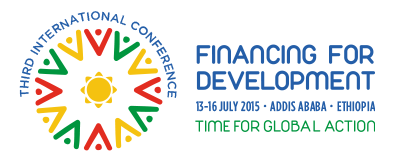On the sidelines of the Third International Conference on Financing for Development (FfD3), the informal UN Inter-agency Working Group (IAWG) on a Technology Facilitation Mechanism noted that innovative and affordable technology solutions will have to be developed, transferred and disseminated at an unprecedented scale in order to eradicate poverty and achieve sustainable development at a global level by 2030.
It also outlined the need to: build science, technology and innovation (STI) capacity and enabling policy environments; and facilitate technology development, transfer and dissemination.
 13 July 2015: On the sidelines of the Third International Conference on Financing for Development (FfD3), the informal UN Inter-agency Working Group (IAWG) on a Technology Facilitation Mechanism noted that innovative and affordable technology solutions will have to be developed, transferred and disseminated at an unprecedented scale in order to eradicate poverty and achieve sustainable development at a global level by 2030. It also outlined the need to: build science, technology and innovation (STI) capacity and enabling policy environments; and facilitate technology development, transfer and dissemination.
13 July 2015: On the sidelines of the Third International Conference on Financing for Development (FfD3), the informal UN Inter-agency Working Group (IAWG) on a Technology Facilitation Mechanism noted that innovative and affordable technology solutions will have to be developed, transferred and disseminated at an unprecedented scale in order to eradicate poverty and achieve sustainable development at a global level by 2030. It also outlined the need to: build science, technology and innovation (STI) capacity and enabling policy environments; and facilitate technology development, transfer and dissemination.
Convened by the IAWG, the side event focused on the role of STI in achieving sustainable development. It took place at the UN Economic Commission for Africa (UNECA) in Addis Ababa, Ethiopia, on 13 July 2015.
In a statement delivered on behalf of the IAWG, Irina Bokova, Director General, UN Educational, Scientific and Cultural Organization (UNESCO), recalled that the FfD3 outcome document – the Addis Ababa Accord – currently includes a decision to establish a technology facilitation mechanism (TFM), which should be launched at the UN Summit for the adoption of the post-2015 development agenda in September 2015.
As mentioned in the version of the Addis Ababa Accord of 7 July 2015, the TFM comprises: a UN inter-agency task team on STI for the Sustainable Development Goals (SDGs) to promote coordination, coherence and cooperation within the UN System on STI related matters; a multistakeholder forum on STI for the SDGs; and an online platform to establish a comprehensive mapping of, and serve as a gateway for, information on existing STI initiatives, mechanisms and programmes, within and beyond the UN.
Bokova, for the IAWG, said the Group: stands ready to support Member States’ ambition to establish the envisaged TFM; is committed to engaging all interested stakeholders and to support STI-focused partnerships for the SDGs; will strengthen UN System inter-agency cooperation and networks on STI, and support locally appropriate solutions; encourages all development banks to recognize the important place of STI initiatives in their work programmes; commits to support STI capacity building, especially in developing countries; will explore strengthening “our” respective organizations’ STI expertise through appropriate staffing practices; and will continue to enhance and integrate STI into “our” organizations’ work, and to fully support and enable the development of the envisaged TFM as guided by “our” respective organizations’ mandates and work programmes.
Macharia Kamau, Co-Facilitator of the intergovernmental negotiations on the post-2015 development agenda (Kenya), observed that development can no longer be seen as a cooperation effort for developing countries only, but is now defined as a “transformational experience for the entire world.” He noted that this will require a different way of engaging with STI, “one that bridges the North-South divide.” He added the SDGs are indivisible and STI will be critical in addressing the highly interconnected sustainable development challenges in a comprehensive and integrated way.
Mukhisa Kituyi, Secretary-General, UN Conference on Trade and Development (UNCTAD), stressed the importance of enhanced UN coordination and the need to use STI for job creation and qualitative transformation of growth.
The informal UN Inter-agency Working Group on a Technology Facilitation Mechanism was established during the last quarter of 2014 and is currently comprised of: the UN Department of Economic and Social Affairs (DESA); the UN Environment Programme (UNEP); UNCTAD; the UN Industrial Development Organization (UNIDO); the International Telecommunication Union (ITU); the World Intellectual Property Organization (WIPO); the World Bank; and UNESCO. [Event Webpage] [UNESCO Press Release] [IAWG Statement] [IISD RS Story on IAWG’s Establishment] [IISD RS Coverage of FfD3]